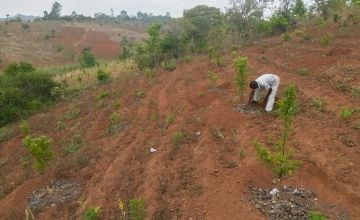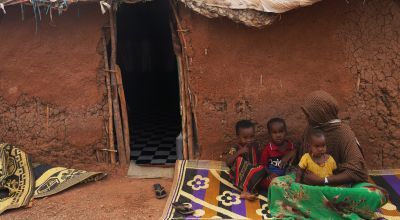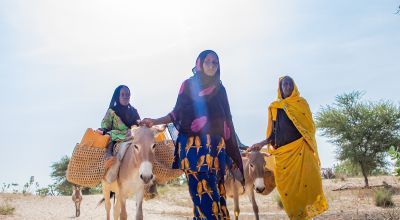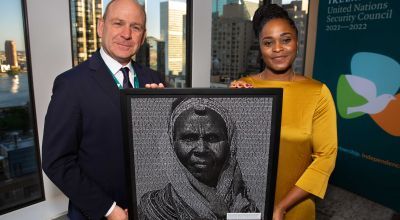
Read our 2023 annual report

Knowledge Hub
Climate change is a global issue, with every part of the world seeing the effects of global warming taking hold. But not everywhere is affected equally.
The Global North is most responsible for climate change, being responsible for 92% of excess global emissions, yet it is the Global South that suffers the worst consequences, from rising temperatures to changing rainfall patterns and extreme weather events. However, while the Global North still struggles to implement basic improvements like recycling, and continues to increase our consumption of fast fashion, people in the Global South are taking sustainable steps to tackle the impact of climate change.
As part of the European Union and Irish Aid-funded climate campaign 1Planet4All, Concern Worldwide and presenter and influencer Fionnuala Moran visited Malawi to speak to young climate activists and environmental studies students about climate change - how it is affecting their country, what they are doing to fight it, and what they think we need to do to combat it.
The effects of climate change on Malawi
Malawi massively depends on agriculture. Over 80% of the population is employed by the agriculture industry, with many families relying on subsistence farming - that is, growing enough to meet their own needs - to put food on the table. However, this means that Malawi is especially vulnerable to climate shocks.
While Malawi’s rainy season usually spans from October to April, the 2022 rainy season had a poor start, with rains not beginning until January and even then being below-average for many parts of the country. This led to delayed, reduced or even destroyed harvests for farmers. Meanwhile, the region has been devastated by cyclones, with Cyclone Ana in early 2022 causing widespread flooding in Southern Malawi and affecting the national electricity supply. This level of uncertainty around their livelihoods means that families cannot rely on their harvests to feed themselves and provide an income.

Malawi also has one of the highest rates of deforestation in the world, due to its dependence on wood for energy - only approximately 13% of Malawians have access to electricity. This in itself exacerbates climate change by causing more greenhouse gases in the atmosphere, and causes further hardship for farmers by eroding soil.
Smart Rick Bwanali, a permaculture assistant, student videographer and storyteller, told us: “The biggest issue that Malawians are facing is climate change. If you go into the village and ask an ordinary person about the biggest issue they are facing in their life, they would maybe tell you about hunger, about lack of money. But remember, Malawi is an agriculture-based country. That means for us to eat, for us to have money, we have to grow crops. We have destroyed the environment, we have cut down trees, we are not receiving enough rainfall, and the soil is also infertile, not as it used to be in the past.
"Now, if you ask farmers, they say, we don’t have food, because they didn’t harvest last year. Right now, farmers, they don’t have money, they don’t have food, what are they going to do? They are going back to the remaining forest, they are cutting down trees for firewood and for charcoal-making for sale. Once they sell those, they buy food and they also buy fertiliser, which is also polluting their soils. They do that in the hope that maybe in the next growing season, they are going to harvest more, but how are they going to harvest more if they are still continuing to destroy the environment?
“This country, little by little, is dying, because people are doing things in the hope that maybe we are going to survive, but they are still destroying the environment because they don’t have something to depend on. Everything that is happening is happening because of climate change. If climate change was not there, people would be able to harvest, they would be able to put food on the table - but now, life is hard.”
Everything that is happening is happening because of climate change
Innocent John, a student at the Lilongwe University of Agriculture and Natural Resources (LUANAR), said: “My biggest worry about the environment is the damages that are caused by catastrophic events that come due to climate change, for instance, tropical cyclones. Tropical Cyclone Ana and Tropical Cyclone Gombe caused devastating damages to Malawi as a nation. I am also worried about global warming, the combination of greenhouse gases in the atmosphere which are caused by unclean energy sources, for instance, the use of charcoal and other fossil fuels.
“The biggest thing we are facing now is food insecurity, and also trying to tackle poverty. That is a barrier to all the environmental campaigns here in Malawi. For instance, trying to eliminate the use of charcoal and firewood. Due to the poverty that we have as a nation, you cannot tell a citizen that has a family of eight which relies on a charcoal business to stop that and go into other things.”
Golden Magalasi, a member of the National Youth Network on Climate Change in Lilongwe, added: “Looking at the way we cut down trees right now, in five years time, if we can’t change, we will have no trees. The climate will change, we will not be able to harvest, we will face global warming - as a country, we will face a lot of consequences.”
Sustainable steps
With changing rainfall patterns, rising temperatures and weather events, Malawians are seeing the effects of climate change on a daily basis. But instead of waiting for it to get worse, many are taking steps to reduce climate change and boost their sustainability.
Many of the young people we spoke to, including LUANAR student Mercy and NYNCC member Golden, explained how many Malawians are using briquettes as an alternative to charcoal. Charcoal - which is used for cooking - is a leading cause of deforestation, and produces a lot of smoke when burned, resulting in indoor air pollution. Enter briquettes. Briquettes are formed with anything from waste paper to leaves, from crushed groundnut shells and cassava flour to sawdust and water. These briquettes are compressed and dried out to later be burned as a sustainable and cleaner fuel for cooking.



There is also a rise in the use of biogas. Biogas is a sustainable energy that uses a digester to convert organic matter - food waste, animal waste, farm waste, and even human waste - into energy. It’s complicated, but the digester system is like a compost bin that all organic waste is disposed of into. The waste is submerged in water, which creates an environment that allows bacteria to break down the waste into methane. This methane is converted into cooking gas, while the waste can also be used for fertiliser.
As NYNCC member John Mchawa told us: “It is not waste until you waste it.”
In addition to opting for cleaner fuels, young people in Malawi are using their voices to influence change. We met with the NYNCC in Lilongwe, who are advocating for change at individual, community, national and global levels by campaigning on various climate change issues, while students at LUANAR have formed an environmental club to campaign for bans on thin plastics, amongst other things.
They are also making sure they are role models by enacting these changes themselves. Christiana Rocha, who is studying for a bachelor’s degree in natural resources management - land and water, makes donuts to sell as part of a side business, but realised that she was contributing to the use of thin plastics.

“When I walk around campus or when I go to church, I see a lot of thin plastic bags on the road. There are animals grazing on the road and they are eating the thin plastic,” she explained. “I used to sell donuts using thin plastics. But I kept thinking, I am contributing to this, so what should I do next? I stopped using thin plastics. I encouraged my customers to use their own containers or plates to reduce the use of thin plastics. I also gave out flyers to my customers which read ‘thank you for joining hands with us to save the earth by reducing the use of thin plastics. Highly appreciated.’”
Changes at a global level
While these steps are admirable and vital, the young people we met know that only so much can be put into action by the individual. For climate change to be truly tackled, governments - particularly in the Global North - need to take action.
When we spoke to students at LUANAR and members of the NYNCC, we heard many suggestions on what was needed to solve climate change - teaching people how to adapt, introducing mass transportation networks, completely transitioning from fossil fuels to renewable energy, introducing climate change education into the curriculum, banning thin plastics, and providing alternative and affordable energies, to name but a few. However, the main demand we heard was for Global North leaders to make good on the pledges they have already made.
LUANAR student and activist Ian Nagoli said: “At one of the previous COP meetings, they agreed that they would commit $100 billion per year to combat the various climate change issues that affect the Global South. During these COP meetings, the global leaders never came to a consensus about the issues that are there. They just talk about them and never come up with actual strategies. They have to come up with actual strategies that will work. They have to admit they are part of the problem, and they have to be part of the solution too.”



NYNCC member Tarcizio Kalaundi added of the $100 billion climate finance annual pledge, which has yet to be fulfilled: “We feel like we’ve been cheated on that. More has to be done. We need to move from commitments, because commitments are often seen as a favour. It should become an obligation. Maybe we should start talking about sanctions.”
It is important to listen to these voices - the voices of those who are most impacted by climate change - and amplify them. This is why we are taking these messages to COP27, where leaders, diplomats and activists from all over the world are meeting in Egypt to come up with a unified strategy to save the planet.
Dominic Amon Nyasulu, coordinator for the NYNCC, acknowledged that many people are disillusioned with political action on climate change thus far, but believes conversations like those taking place at COP remain vitally important to hold world leaders to account. “When we elect leaders, we have the belief they carry out the aspirations of the people that they represent. So such an instrument is our hope, because all leaders come together for the same purpose. But if we look at the way our leaders are managing the discussion, there is a section of people who are vulnerable and who are really impacted by climate change. They are losing hope, because the more we keep discussing it at COP, the more people are suffering. I think people have now started losing hope in our leaders because of the way they are delaying making sure that some of the key issues that are supposed to be done right now.”
One thing is for sure - from what Concern saw visiting Malawi, these young activists will continue to hold officials and leaders to account, and leading by example, will inspire a generation to fight for our planet.





